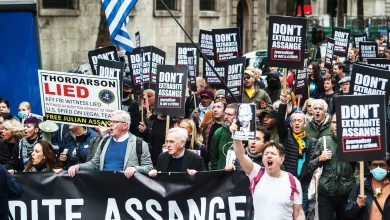
Reporting on Donald Trump Responsibly
Donald Trump will campaign in the 2024 presidential election, posing unique problems for journalists. His leadership role in the January 6 insurrection, the violent effort to obstruct the peaceful transfer of power, makes traditional campaign reporting inadequate to describe the current political situation. One reason for this problem is that though the insurrection itself was blocked, the forces that drove it forward continue to this day.
To illustrate the reportorial problem, consider William Brangham’s recent interview on the PBS News Hour with Ralph Reed, the founder, and chairman of the conservative Faith & Freedom Coalition. Mr. Brangham interviewed Mr. Reed shortly after the former president appeared at his first campaign rallies in New Hampshire and South Carolina. He wanted to know how strong Mr. Trump’s support was among evangelical Christians, an important part of his base in 2016 and 2020. Mr. Reed said that he thought Mr. Trump still had a “very deep reservoir of affection and appreciation” in the faith community, and he cited, among other things, Mr. Trump’s appointment of three conservative Supreme Court justices.
However, Mr. Brangham noted some sentiment in the evangelical community that the former president “comes with a good deal of baggage. There are swirling investigations. The left certainly voted him out the last time. He still is focused on the past election and his lies about what happened there.”
In reply, Mr. Reed quoted from Lindsay Graham’s introduction of Donald Trump in South Carolina, saying, “If you think you’re gonna be able to get Trump policies without the personality and person of Trump, you misunderstand the strength and the fortitude behind those policies.”
It isn’t easy to come away from viewing that interview without some feeling of its surreality.
To his credit, Mr. Brangham referred to Mr. Trump’s lies about the last election, as do many mainstream journalists when referring to the former president’s claims that the election was “stolen.” But the closest Mr. Brangham got to the chaos and destruction of that day was the vague generalizations, “baggage,” and “swirling investigations.”
Yes, the January 6 Committee of the 117th Congress recommended four charges against Donald Trump and his associates: obstruction of an official proceeding, conspiracy to defraud the United States, conspiracy to make a false statement, and insurrection. And indeed, investigations are mainly focused on the 2020 election and its aftermath moving forward on both federal and state levels.
But whether or not investigations result in convictions, it isn’t difficult for many Americans to recall images from January 6: the exhortations by Donald Trump (“we must stop the steal and then we must ensure that such outrageous election fraud never happens again . . .”) and the subsequent attacks on the Capitol and the police defending it. As a result of that day’s events, four members of the crowd died, along with nine police officers, four of the latter by suicide.
It’s tempting today for journalists to fall back on familiar horse-race modes of campaign reporting and speculating, e.g., which Republican contenders are strongest against Mr. Trump? How would Mr. Biden fare if Mr. Trump again emerges as the candidate?
But to do so is irresponsible in the context of January 6 and its aftermath.
The authoritarian forces leading to the events of that day still operate today. Of the 222 members of the Republican Caucus in the current Congress, 119 had voted on January 6, 2021, to block certification of the 2020 election results: an election denial that, in its essence, represents a maximalist form of voter suppression.
Authoritarianism also operates in violent political rhetoric and violent threats against candidates and public officials, elements that have become increasingly part of the political landscape. They are also in conspiracy theories that continue to undermine bonds of trust essential to maintaining democratic communities.
Of the 59 presidential elections held over the course of American history, the 2024 election is unique because of the involvement of a major candidate, a former president, in the effort to block the results of the previous election – an effort that resulted in tragic violence.
It shouldn’t be insurmountable for journalists to widen the frames of their reporting and interviewing in ways that honor accurate memory and present reality. Nor should it be insurmountable for citizens to demand this more truthful form of reporting and commentary.
A strengthened democracy, a more resilient democracy, must be grounded in truth. Journalists, and the publics with whom they communicate, have a responsibility to engage in the search for that truth together.
Andrew Moss, syndicated by PeaceVoice, is an emeritus professor (English, Nonviolence Studies) at the California State Polytechnic University, Pomona.




